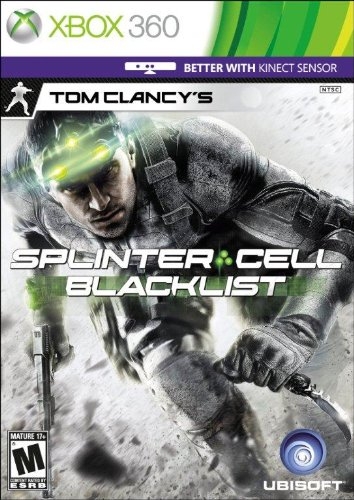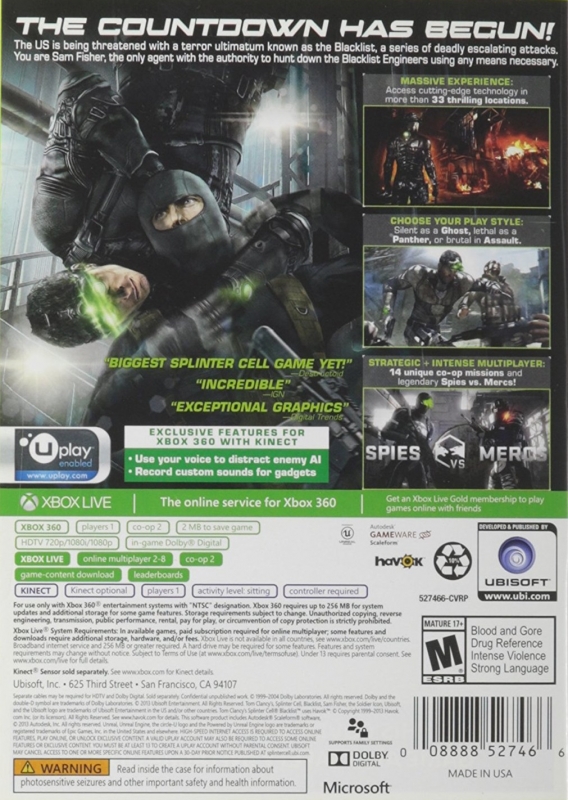Existing User Log In
New User Registration
Register for a free account to gain full access to the VGChartz Network and join our thriving community.





America - Front


America - Back

Splinter Cell: Blacklist is a game that is seemingly unable to commit to anything. At times it’s a reflection on the modern state of surveillance and the war on terror, then retreats to glorify the very things it seemed to be criticizing. It’s a game that tries to present a return to the pure stealth of previous entries, yet frequently falls back on modern action-shooter cliches. One section even dabbles in a change of perspectives in a first-person section that wouldn’t be out of place in Call of Duty and Tom Clancy’s own Rainbow Six franchise, then switches back like nothing happened at all. Thankfully, there is at least one thing that Splinter Cell: Blacklist commits to, and that’s smooth, polished stealth gameplay that rewards patience, risk-taking and multiple play-styles. And in a Splinter Cell game, that’s enough to satisfy.
Especially after 2010's Splinter Cell: Conviction, which in the eyes of many fans abandoned the series’ stealth roots in favor of a more “Bourne”-esque action-oriented approach. And although I thought Conviction’s shift in gameplay style was more than appropriate for the revenge story it was trying to tell, it’s good to return to more standard, stealth-based espionage affairs on which the series was built.
To appease both Splinter Cell fans old and new, Blacklist encourages players to pick and choose their own play style, be it silent or clamorous, lethal or non lethal, or any combination of thee as you play through the relatively lengthy campaign. Silent and non-lethal remains the most satisfying, attempting to ghost through levels undetected not only providing the most challenge but also the most points, which can be turned into currency to upgrade your weapons and gear. The illusion of pure stealth breaks during a handful of missions where full frontal assault is all but required, becoming indistinguishable from the variety of other third-person shooters on the market. For the most part, however, Blacklist is a return to the redefined stealth-action that fans have been craving since 2005’s Chaos Theory.
Splinter Cell: Chaos Theory is easily the game to which Blacklist strives to draw the most comparisons. On top of the greater emphasis on stealth, there’s also a greater selection of gadgets than has ever been in the franchise. Sticky cameras, sleeping gas, smoke grenades, proximity mines, breach explosives, and a plethora of upgradeable weapons make this easily the most customizable experience in the series. Level design also harkens back to Chaos Theory, which, although being mostly linear, provides multiple routes through each level that make me look forward to multiple replays.
Blacklist also expands on gameplay elements introduced in its predecessor, Splinter Cell: Conviction, most notably the “Mark and Execute” feature. One of the biggest complaints about M&E was it essentially being a “press Y to win” button, and it has noticeably been scaled back in this entry. In its original iteration, Mark and Execute allowed you to tag enemies with your cursor, and automatically dispatch with them after taking down an enemy using close quarters combat. Now, Mark and Execute requires four combat takedowns - regardless of them being through melee or firearms - to unlock, and is now used more as a last resort than being the entire mechanic around which the game was built like in Conviction.
The first-person shooter section mentioned in the first paragraph appears than disappears completely without context, but it at least serves as introduction to the returned Spies vs. Mercenaries online multiplayer mode. Veterans of Splinter Cells Pandora Tomorrow and Chaos Theory will be instantly familiar with the unique multiplayer mode, but for the unfamiliar, Spies vs. Mercenaries involves teams of mercenaries, playing in first-person, defending against a team of spies, playing in the same third-person perspective as the single-player. Blacklist’s shift in gameplay provides for an overall faster experience, yet playing as a mercenary with the knowledge that an unseen spy could be right on top of you provides for some of the most harrowing moments in current multiplayer gaming.
Co-op play also returns, featuring Sam and newcomer Isaac Briggs (who wouldn’t surprise me to be a contender for future protagonist of the franchise) in over a dozen missions all with their own mini-narratives. Most of them can be played solo as well, but co-op play is encouraged as many levels contain locked-off sections that require a second player to proceed. As always, cooperation brings a new dynamic to gameplay, and some of the Blacklist’s most intense segments come from working together to avoid detection.
For everything great I admire about its gameplay, Splinter Cell: Blacklist’s story and presentation is easily its weakest aspect, which is a shame due to its inherently interesting set-up: A terrorist group calling themselves “The Engineers” have demanded that the US withdraw all of its troops stationed in foreign countries worldwide, lest they conduct an attack on terrorist soil for every day their demands are not met. Cue Sam Fisher, and his team of intelligence operatives who are the only ones who can stop them in the newly instituted Fourth Echelon. It begins promising enough, appearing to offer a critique of the American military complex, our current foreign policy, and the current NSA surveillance controversies. Unfortunately, anything the game has to say at all falters out by the game’s end, instead comfortably resting in the pages of another trope-filled spy fiction.
The biggest missed opportunity is showcased in a level set inside Guantanamo Bay, wherein Sam Fisher uses torture to extract information from the enemy, yet the game appears to care not about the politics of the scene, quickly moving on to a standard “escape the base” segment that could have just as easily taken place in any fictional location.
Even more detrimental to the experience is the manner in which the characters are portrayed. The loss of Michael Ironside in the role of Sam Fisher is truly missed, as Eric Johnson’s take on the character doesn’t carry nearly the same amount of gravitas. Sam Fisher, who is now pushing 60 in this timeline, looks, moves, and sounds like a 30 year-old man. What’s also incredible is just how much of a jerk Sam Fisher is in this. The old Sam Fisher was dry and cynical, but there was also a warmth beneath the cold exterior that isn’t present here. Perhaps the events of Splinter Cell: Double Agent and Conviction were more traumatizing for Sam than he let on, but the Sam Fisher of Splinter Cell: Blacklist has transformed from one of the most iconic characters in gaming into an unlikeable prick. The same goes for Sam’s supporting team (with the exception of Briggs, who I really hope gets to return in future games). As a result, the game ends up coming across as you playing as a group of bullies; "Take our troops out of foreign countries? Well let's just send one of our super-spies over and AMERICA you into submission."
All in all, Splinter Cell: Blacklist should be commended for simultaneously trying to return to the series’ roots while keeping it relevant for modern audiences. However, its desire to portray complex issues whilst skirting around them makes it more open to criticism than other modern war games. As in most games, the world is once again safe and sound by the time the credits roll, but I was left with a bad taste in my mouth. Then again, maybe this is how I’m supposed to feel, perhaps to mimic Sam Fisher’s feelings towards the questionable things he does over the course of Splinter Cell: Blacklist’s narrative. But something tells me that isn’t the case.










| Total Sales |
0.01m
Japan |
0.57m
NA |
0.33m
Europe |
0.09m
Others |
1.00m
Total |
| 1 | n/a | 170,451 | 56,869 | 40,637 | 267,957 |
| 2 | n/a | 57,894 | 35,003 | 14,744 | 107,641 |
| 3 | 4,827 | 28,074 | 19,294 | 7,289 | 59,484 |
| 4 | 716 | 13,690 | 13,411 | 3,795 | 31,612 |
| 5 | 261 | 7,270 | 10,945 | 2,244 | 20,720 |
| 6 | 151 | 3,410 | 7,285 | 1,182 | 12,028 |
| 7 | 113 | 2,808 | 5,497 | 944 | 9,362 |
| 8 | 94 | 3,151 | 4,202 | 940 | 8,387 |
| 9 | 81 | 4,258 | 4,069 | 1,174 | 9,582 |
| 10 | 70 | 4,441 | 4,731 | 1,254 | 10,496 |
|
|
I LOVE GIGGS
posted 18/10/2013, 03:02
Just finished the game! Great game. I don't know why it got low scores from the critics! This game deserve more than this. Please buy! Message | Report |
|
|
thewastedyouth
posted 23/09/2013, 02:23
I remember when the first one came out on the original xbox, sold like 3 millions. amazing time Message | Report |
|
|
sonicphoto
posted 19/09/2013, 01:20
I think the sales are okay, the previous games were not huge. Message | Report |
|
|
|
|
|
BertaDCurren758
posted 07/09/2013, 12:58
my Aunty Isla just got white Chevrolet Corvette ZR1 by working part time from a macbook air. learn the facts here now .................... www.cnn13.com Message | Report |
|
|
Mr Puggsly
posted 04/09/2013, 04:41
Modest opening. I hope word of mouth helps this one over time. Its pretty damn good. Message | Report |